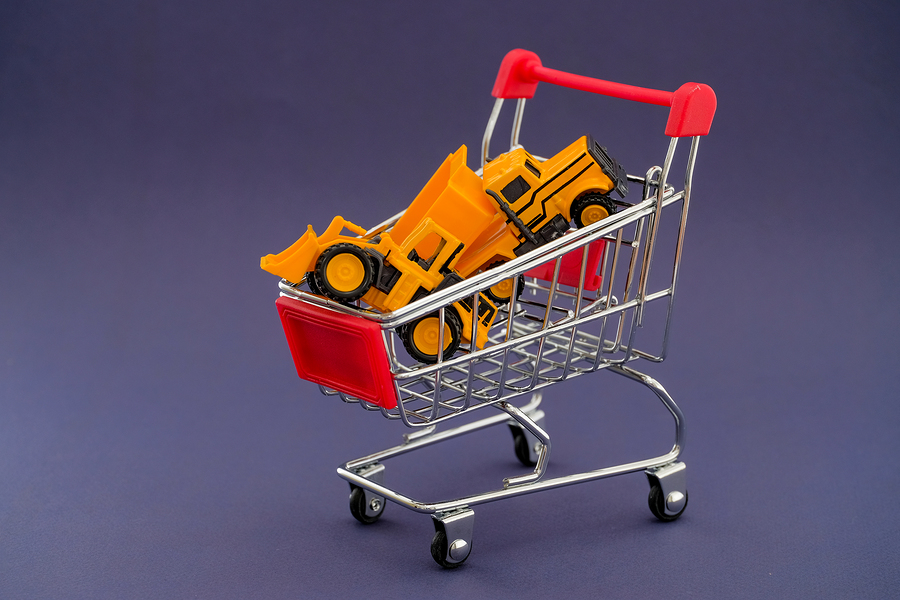Two of the most significant expenses in the construction industry are payroll and equipment. A construction company cannot operate without either one; decisions need to be made about buying or leasing equipment. Construction equipment can be very costly, running into several thousand dollars, depending on the machine.
Construction companies need new equipment for a variety of reasons:
- It’s time to replace some older equipment
- You have big contracts lined up and will need more equipment
- You’re growing your company’s competencies
So, what should you consider before renting, buying, or leasing equipment?
Choosing an Option
One way to gauge which choice best fits your needs is to consider how often that piece of equipment will be used. If you determine that you will use it less than 60% of the time, renting would be your best choice. However, if you decide that you will exceed that threshold, leasing or buying the equipment would be your best option.
Quality Matters
Buying the best quality of new or used equipment that fits your budget will pay for itself in the long term. When renting, you typically are paying for state-of-the-art equipment and technology. However, you can purchase used equipment that has been well-maintained for a fraction of the cost of new and more cost-effective than renting.
What to Consider
Several factors come into play when considering which way to go on equipment replacement or additions, i.e., the proposed rate of usage and equipment availability.
- Start by evaluating your company’s financial situation
- Do you have the means to buy at this time, or would renting be a better choice? Remember, the rental costs add up quickly.
- Examine your future costs over the next 12-36 months
- By financing, you can decrease the financial impact. Finance rates are at an all-time low, so keep your operating capital intact.
- Perform your due diligence and carefully consider which acquisition method would benefit you the most
- Evaluate the cost of owning equipment v. renting
- With ownership, you have operating costs and maintenance
- Insurance fees and licensing are also associated with ownership
- Rental equipment costs include transportation fees to and from the job site
- Consider if the equipment is a real need or only one that is going to make your life easier
- Keep in mind that if you buy, you can recoup some of your investment when you sell.
- Consider the tax advantages or implications (capital gains tax)
- Talk to your financial advisor about buying v. renting
Project Length
Project length could be your most significant determining factor in deciding whether you should buy, lease, or rent equipment.
- For short-term or one-off jobs that call for specialized equipment, renting may be more feasible.
- The most significant risk in renting equipment is the machine may sit idle on account of project schedule changes or unforeseen delays; you’re wasting your money.
If you have several jobs lined up that call for the same piece of equipment, or you have a long-term project that calls for repeated use of a specific piece of equipment, then buying would be the most cost-effective procurement method. Multi-purpose pieces of equipment, such as excavators, loaders, forklifts, skid steers, and trucks are great assets on your job sites.
Availability & Flexibility
The most significant advantage of leasing or owning equipment is its availability. If unexpected changes occur, especially in schedules, or you are asked to take on a job on short notice, you have the flexibility and control to accept those projects with minimal downtime.
One of the most considerable potential risks of renting equipment is its availability—it may not be available when you need it. Jobsites are notorious for turning in rentals past their due date; owning equipment projects stability and trustworthiness to potential clients.
Fleet management
Owning equipment provides you with an absolute peace of mind by:
- Managing the maintenance schedules
- Knowing who does your maintenance
- Availability to schedule jobs and equipment
- Knowing who is operating your equipment
- You can recover a portion of your investment by selling it at auction
Operating Costs
An excellent source that can address operating costs is the United States Army Corps of Engineer’s Construction Equipment Ownership and Operating Expense Schedule (ACOE) Equipment Schedule.
Leasing equipment provides benefits of both buying and renting.
These benefits include:
- Terms can be for days, weeks, or months
- Leasing has fewer upfront costs
- It frees up capital
- Leasing doesn’t tie up credit lines
- You have the option of getting a new model later on
- Leasing may offer flexible terms, i.e., seasonal payments or small payments during off-peak
The downside to leases is that they carry higher interest rates, higher insurance rates, and huge penalties if you break the contract early. Substantial penalties may also be assessed for wear and tear or damage. Depending on the type of lease, you may also be responsible for all taxes, maintenance, and insurance; however, you get to write-off interest and depreciation on the equipment.
Improve Your Cash Flow
Depending on the scope of your construction company, you may have to use all three options to meet your equipment needs best. You may own some core equipment, lease other pieces, and occasionally rent special equipment to during peak times to perform specific tasks.
Diversifying and go after the larger, more lucrative contracts – by renting, you won’t have to keep putting off bidding these jobs because you don’t have the cash flow. Your company can broadcast the same capabilities as larger companies and achieve the same results, but at a lower cost when you rent.
Keep things affordable and stop losing business!
Vandalia Rental Company can help you with all your heavy equipment needs. Our knowledgeable staff will assist you in selecting the right equipment for your job as well as the right financing option. Give Vandalia Rental a call today for a free quote!


